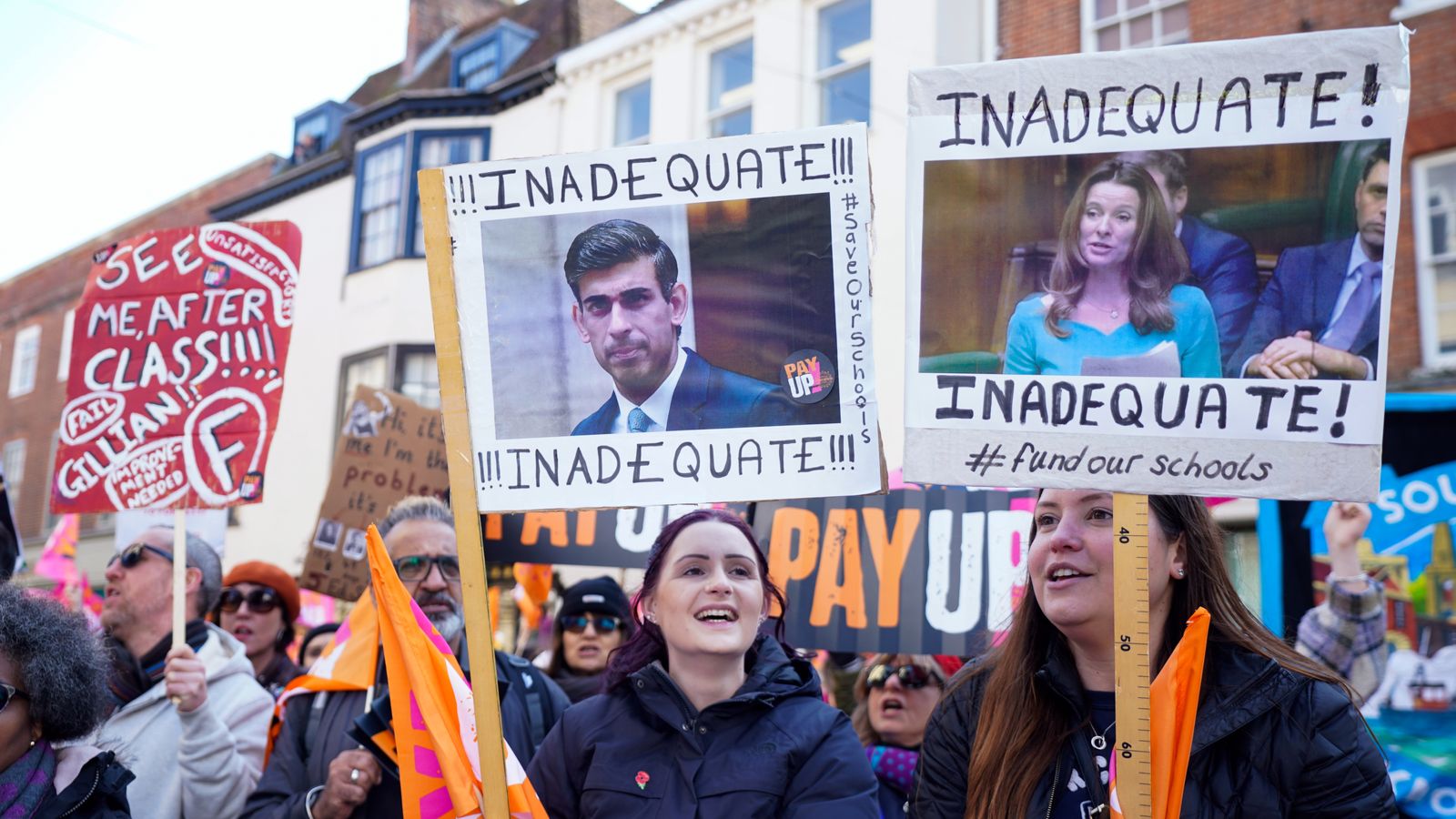The leader of the UK’s largest teaching union has refused to rule out fresh strikes which disrupt exams after recommending that members reject an “insulting” pay rise.
The government has offered teachers in England a £1,000 extra cash payment this year and an average 4.5% increase next year in a bid to end the long-running dispute over wages and conditions.
Mary Bousted, the joint general secretary of the National Education Union (NEU), said its executive committee “looked carefully at the offer and decided it was really insulting” but members “will either take that advice or ignore us”.
When asked whether that could lead to more strikes over the exam period if the offer is turned down, she told BBC Radio 4’s Today programme: “We really hope that that doesn’t take place.
Politics live: Jeremy Corbyn blanks questions as he awaits ban later today
“What we hope is that if the members do reject the offer… we want to go back to the government and say: ‘you have to do better’, reopen negotiations, and let’s see if we can get an offer that members will find respectable and will accept.”
Asked again about whether strikes would disrupt exams, Ms Bousted said: “We will plan more strike dates. We don’t want to disrupt exams and we will try to ensure that we do reopen negotiations.”
Civil servants to stage fresh walkouts as teaching union tells members to turn down offer
RMT suspends plans for rail strikes on 30 March and 1 April
Tens of thousands of university staff on strike today – with more to come
Pressed on the issue a third time, she said: “We have conference next week, and conference will decide the plan of action, but no teacher wants to disrupt exam dates at all, so it’s up to the government.”
Ms Bousted also clashed with presenter Nick Robinson over the suggestion Daniel Kebede, who is vying to succeed her, is considered by some as an “extremist” who would plan strikes on exam days.
Read More:
Almost 280,000 nursing staff to vote on new NHS pay offer in England
“I think that’s an outrageous slur,” she said. “We’re not getting into personalities four days before an election. I wouldn’t describe either of my successors as an extremist.”
The NEU’s ballot opened on Monday and will close on Sunday 2 April.
The Department for Education (DfE) said it had “put forward a fair and reasonable offer” which also includes a commitment to “reduce workload by five hours each week”.
The government claims the rise is fully funded, but the NEU, whose members have been involved in recent strike action, said up to 58% of schools would have to make cuts next year to afford it.
Please use Chrome browser for a more accessible video player
The NASUWT and the Association of School and College Leaders (ASCL) said they will ask for feedback from members before deciding what to do next, while the headteachers’ union NAHT said its national executive committee will consider the details on Monday evening before deciding its next steps.
All four unions want an above inflation pay rise funded by extra money from the government, and have been involved in intensive negotiations with the Department for Education for the past ten days.
Many teachers in England received a pay rise of 5% in September 2022 but unions say this was a cut due to inflation and poor pay is driving them out of the profession.
In Scotland, the row over teacher pay has been resolved after the EIS union voted to accept a backdated 7% increase from April 2022, and a 5% increase from this April.
In Wales the NEU has voted to accept a 3% pay rise for this year and a 5% pay rise for next year, though this was rejected by NAHT Cymru.
A DfE spokesperson said: “The government has put forward a fair and reasonable offer, backed with funding for schools.
“The offer provides an average 4.5% pay rise for next year, puts £1,000 into the pockets of teachers as a one-off payment for this year, and commits to reducing workload by five hours each week.
“This is a good deal for teachers that acknowledges their hard work and dedication.”








